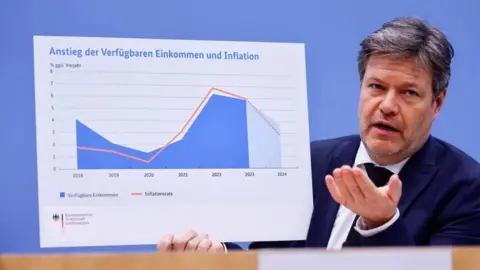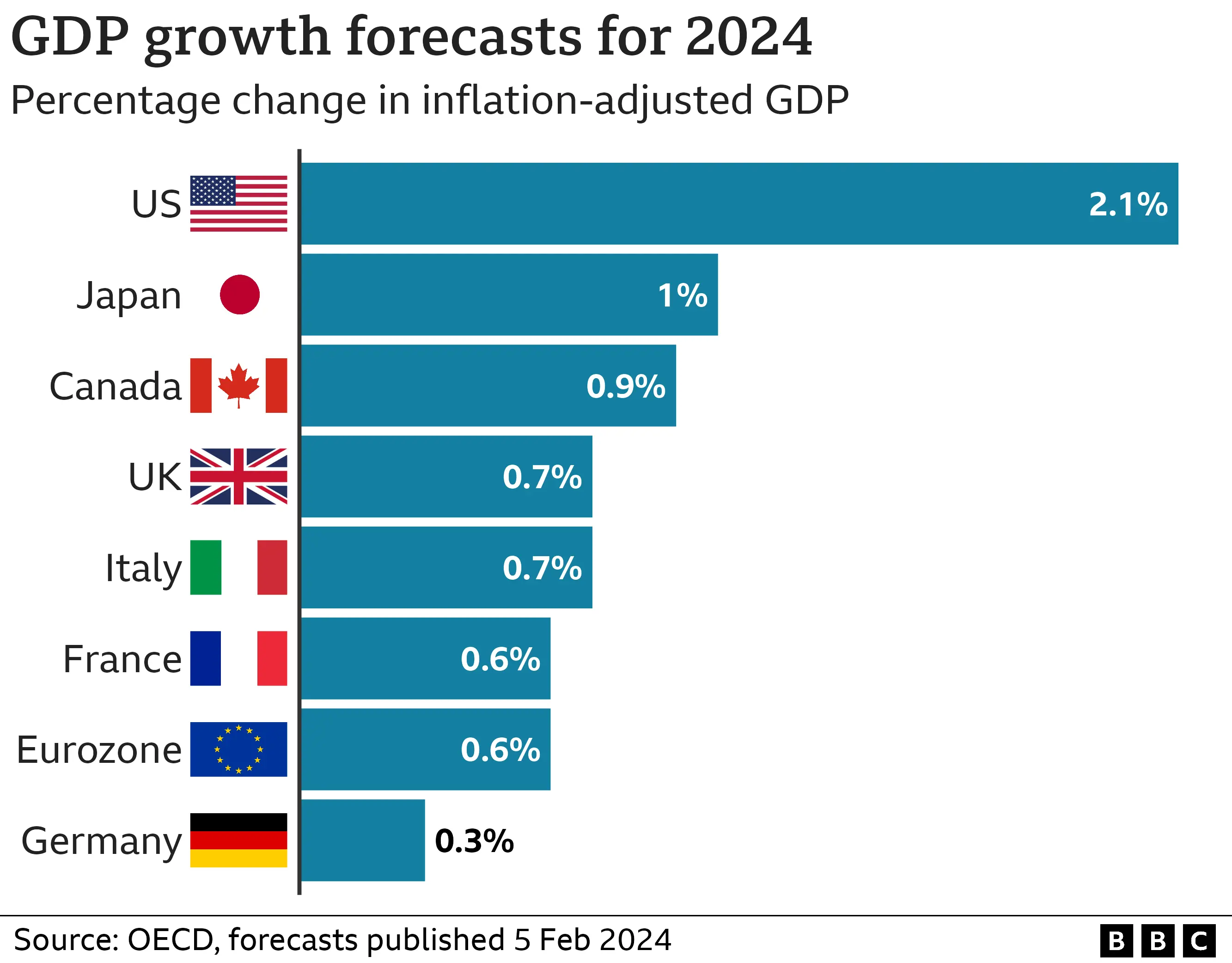風蕭蕭_Frank
以文會友v
德國經濟根基不穩,希望之光微乎其微
https://www.cnbc.com/2024/02/12/germanys-economy-is-on-shaky-ground-and-there-are-few-signs-of-hope.html
作者:索菲·基德林 2024 年 2 月 12 日
關鍵點
德國經濟一直舉步維艱,最新數據顯示改善的希望渺茫。
經濟學家表示,最糟糕的時期可能很快就會過去,但仍對 2024 年經濟增長不抱希望,並暗示該國今年可能進入技術性衰退。
不利因素包括全球貿易放緩、能源價格上漲以及國內和國際政治不確定性。

聯邦總理奧拉夫·肖爾茨(社民黨,右左)、聯邦經濟事務和氣候保護部長羅伯特·哈貝克(90 聯盟/綠黨)和聯邦財政部長克裏斯蒂安·林德納(自民黨)關注預算開始時的辯論 星期。
德國經濟的好消息很少。 而最新的經濟數據並沒有太大改變這一點。
上周公布了 2023 年的幾個關鍵數據,即工廠訂單、出口和工業生產,這些數據表明年底經濟疲軟,德國成為“歐洲病夫”的質疑再次浮出水麵。
貝倫貝格銀行首席經濟學家霍爾格·施米丁對 CNBC 表示:“數據證實,德國工業仍處於衰退之中。”
12月份工業生產環比下降1.6%,2023年總體比上年下降1.5%。 作為德國經濟主要基石的出口,12 月份下降了 4.6%,全年下降了 1.4%,即 1.562 萬億歐元(1.68 萬億美元)。
與此同時,工廠訂單數據乍一看似乎很有希望,12 月份與 11 月份相比增長了 8.9%。
但凱投宏觀(Capital Economics)高級歐洲經濟學家弗蘭齊斯卡·帕爾馬斯(Franziska Palmas)向CNBC表示,這種增長“並不能讓人感到太安慰”,並解釋說,這要歸功於幾筆大規模訂單,而這些訂單往往會波動。 她補充說:“不包括大規模訂單的訂單實際上已降至大流行後的低點。”
2023 年總體而言,工廠訂單較上年下降 5.9%。
Schmieding 表示,雖然 12 月份的“硬”數據尚未表明複蘇即將到來,但最新的采購經理人指數報告表明,製造業最糟糕的時期可能很快就會過去。
視頻1:4301:43
BDR Thermaa:大多數德國家庭需要從石油和天然氣轉向可再生能源
歐洲尖叫盒
他指出:“盡管 45.5 仍低於 50 的增長與收縮分界線,但它已小幅升至 11 個月高點。”
荷蘭合作銀行全球經濟和市場宏觀策略師埃裏克-揚·範哈恩 (Erik-Jan van Harn) 向 CNBC 表示,即便如此,經濟增長也不太可能很快實現。
他解釋說:“我們的德國工業活動仍遠未達到大流行前的水平。” van Harn 表示:“我們仍然預計第一季度將出現小幅收縮,但可能不會像第四季度 23 季度那麽嚴重。” 他預計增長將略有回升,但預計全年增長將持平。
其他人則對德國經濟更加悲觀。
德國商業銀行首席經濟學家 Jörg Krämer 對 CNBC 表示:“我們堅持預測,2024 年德國經濟整體將萎縮 0.3%。”
根據聯邦統計局上個月發布的數據,這與德國經濟 2023 年的表現大致一致,當時德國經濟同比收縮 0.3%。 數據還顯示,第四季度國內生產總值下降0.3%,但德國仍成功避免了技術性衰退,其特點是連續兩個季度負增長。
這是因為統計局發現 2023 年第三季度出現停滯而非收縮。 但如果2024年前三個月經濟如預期萎縮,德國確實會陷入衰退。
克雷默在談到經濟衰退的原因時解釋道:“企業有太多的事情需要消化——全球加息、能源價格高漲、中國的順風車減少以及德國作為商業地點的侵蝕。”
荷蘭合作銀行的範哈恩指出,其中一些不利因素也可能在出口數據疲軟方麵發揮關鍵作用。 他表示,俄羅斯廉價能源、中國強勁需求以及全球貿易激增等因素數十年來一直提振德國出口,“但現在正在衰退”。
專家表示,除了純粹的經濟之外,國內和國際政治也可能對該國經濟構成風險。
德國著眼於 2024 年預算
歐洲尖叫盒
德國憲法法院裁定,將疫情期間未使用的債務重新分配到當前預算計劃是非法的,德國聯合政府在經曆預算危機後一直麵臨壓力。
這給聯盟的預算計劃留下了 600 億歐元的缺口,
盡管資金是在未來幾年分配的,但危機可能會在年底 2025 年預算規劃開始時再次出現。
選民對政府的滿意度也很低,反對黨基民盟目前在民意調查中領先,緊隨其後的是德國極右翼政黨選擇黨。 然而,最近幾周,由於針對極右翼的抗議活動席卷全國,數十萬德國人走上街頭,對後者的支持有所下降。
施米丁表示,在其他地方,美國大選也可能讓事情變得更加困難。
他表示:“特朗普的貿易戰威脅可能對德國產生重大負麵影響。”不過,他指出,這當然取決於選舉結果,而且可能要到 2025 年才會全麵展開。
德國經濟部陷入“困境”
https://www.bbc.com/news/world-europe-68361717
作者:Jessica Parker 和 Damien McGuinness,BBC 新聞,柏林,2024 年 2 月 21 日
EPA 羅伯特·哈貝克 (Robert Habeck) 與顯示通貨膨脹和收入的圖表
Robert Habeck)德國綠黨政治家、作家,任德國副總理、聯邦經濟事務部長。羅伯特·哈貝克此前曾警告稱,德國的經濟形勢“非常糟糕”, 德國經濟正處於“混亂的水域”。
羅伯特·哈貝克表示,德國政府對2024年經濟增長的預測已從1.3%下調至0.2%。
這意味著歐洲最大的經濟體實際上已經陷入停滯——盡管它避免了進入全麵衰退。
哈貝克此前稱德國的經濟形勢“非常糟糕”。
今天,他表示,普京全麵入侵烏克蘭後,德國受到了“非常具體的情況”的打擊,因為德國的能源密集型產業依賴俄羅斯天然氣。
他表示,德國對出口的依賴使其特別容易受到全球貿易格局變化的影響,而德國經濟更廣泛的結構性問題是缺乏工人。 哈貝克表示,如果沒有移民工人,德國經濟就會崩潰。
兩年前俄羅斯全麵入侵烏克蘭後,能源成本飆升。 這引發了通貨膨脹,意味著家庭感到受到擠壓。
德國央行德國央行警告稱,該國實際上可能已經陷入衰退。
德國經濟在 2023 年小幅萎縮,當年第四季度萎縮 0.3%。
德國央行在月度報告中表示,“壓力因素”可能仍然存在,因此經濟產出可能“在 2024 年第一季度再次小幅下降”。
連續兩個季度出現負增長將使德國陷入所謂的技術性衰退。
2024 年 GDP 增長預測
鑒於德國經濟預計 2024 年將小幅增長,經濟學家並不是在談論全麵衰退。
目前通脹率正在下降,失業率仍然很低,能源成本也有所下降,這意味著經濟學家預計今年經濟將逐步複蘇。 盡管預測悲觀,德國還是成功地擺脫了俄羅斯天然氣的依賴。 經過多年的停滯後,許多行業的工資正在上漲,這應該會提振消費者需求。
但企業界對此持悲觀態度。
安德烈·卡西米爾擁有一家建築公司,他表示政府沒有幫助像他這樣的企業
Kasimir Bauunternehmung 建築公司的所有者安德烈·卡西米爾 (André Kasimir) 聲稱,德國正在成為“歐洲病夫”。
業內人士表示,高利率、熟練勞動力短缺以及該國著名的官僚主義使該行業陷入危機。 2023 年,建築行業的破產率上升了 20% 以上。
老板們表示,盡管柏林等城市住房嚴重短缺,但建造新房已經“幾乎不可能”。
建設項目需要很長時間才能獲得批準,而卡西米爾先生還認為供暖和噪音法規成本太高。
“政府不知道該怎麽做才能讓我們的建設和生活變得更容易,”他說。
商界領袖表示,該國的許多經濟困境都是由政治內鬥造成的。 政客們正在就政府刺激經濟的新法律爭論不休。 哈貝克先生起草了一項立法,旨在削減官僚主義,並為德國企業提供數十億歐元的稅收減免。
該法律已在德國議會下議院聯邦議院獲得通過,但遭到上議院反對派保守派的阻撓。
德國總理奧拉夫·肖爾茨(Olaf Scholz)好爭論的三路執政聯盟內部的爭吵也激怒了選民,這意味著政府的民調支持率創曆史新低。 當憲法法院裁定政府預算非法時,最初的計劃以揮霍開支來掩蓋政策分歧,但這一計劃被泡湯了。
學生埃爾梅迪納表示,她對德國目前所提供的東西“不太滿意”
政府領導人對於解決方案持有不同的看法。 經濟部長羅伯特·哈貝克領導的綠黨希望修改憲法債務規則,以允許更多的基礎設施支出。 掌管財政部的自由派將低債務視為神聖不可侵犯,並正在推動嚴厲的緊縮措施。
基爾世界經濟研究所的斯特凡·庫斯教授表示,聯盟內部明顯的分歧造成了很多“不確定性”。
在德國首都的街道上不難發現對政治階層的深深不滿。
“我們有點睡著了,尤其是在安格拉·默克爾(Angela Merkel)政府的領導下,”柏林居民凱瑟琳(Cathrin)說。 “所以我認為我們必須趕上像中國這樣的大型經濟體。”
建築係學生埃爾梅迪納來自科索沃,但由於缺乏良好的工作機會而感到沮喪,她質疑她是否可以
Germany's economy is on shaky ground and glimmers of hope are few and far between
Key Points
- Germany's economy has been struggling and the latest data has provided little hope for improvement.
- Economists say the worst may soon be over, but are still not hopeful about economic growth in 2024 and suggest the country may enter a technical recession this year.
- Headwinds include a slowdown of global trade, higher energy prices, and national and international political uncertainty.
Federal Chancellor Olaf Scholz (SPD, r-l), Robert Habeck (Alliance 90/The Greens), Federal Minister for Economic Affairs and Climate Protection, and Christian Lindner (FDP), Federal Minister of Finance, follow the debate at the start of the budget week.
Michael Kappeler | Picture Alliance | Getty Images
Good news has been sparse for the German economy. And the latest economic data has not done much to change this.
A few key 2023 data points, namely factory orders, exports and industrial production, were out last week and indicated a weak end to the year that saw questions about Germany being the "sick man of Europe" resurface.
"The data confirm that German industry is still in recession," Holger Schmieding, chief economist at Berenberg Bank, told CNBC.
Industrial production declined by 1.6% in December on a monthly basis, and was down 1.5% in 2023 overall compared to the previous year. Exports – which are a major cornerstone of the German economy – fell by 4.6% in December and 1.4%, or 1.562 trillion euros ($1.68 trillion), across the year.
Meanwhile, factory orders data seemed promising at first glance as it reflected an 8.9% increase in December compared to November.
But this growth "is not much reason for comfort," Franziska Palmas, senior Europe economist at Capital Economics told CNBC, explaining that it is thanks to several large-scale orders, which tend to be volatile. "Orders excluding large-scale orders actually fell to a post-pandemic low," she added.
For 2023 overall in comparison to the previous year, factory orders were down 5.9%.
While this "hard" data from December does not yet suggest recovery is in sight, the most recent Purchasing Managers' Index report indicates that the worst may be over soon in the manufacturing sector, Schmieding said.
VIDEO1:4301:43
BDR Thermea: Majority of German homes need to switch from oil and gas to renewables
"Although at 45.5 still below the 50 line that divides growth from contraction, it edged up to an 11-month high," he noted.
Even so, economic growth is unlikely to be imminent, Erik-Jan van Harn, a macro strategist for global economics and markets at Rabobank, told CNBC.
"We are still nowhere near the kind of activity in the German industry that we saw pre-pandemic," he explained. "We still expect a modest contraction in Q1, but it's likely to be less severe than 23Q4," van Harn said. He is then anticipating growth to pick up slightly, but sees full-year growth as being flat.
Others are even more pessimistic about the German economy.
"We stick to our forecast that the German economy will shrink by 0.3% in 2024 as a whole," Commerzbank Chief Economist Jörg Krämer told CNBC.
This would be broadly in line with how Germany's economy fared in 2023, when it contracted by 0.3% year-on-year, according to data released by the federal statistics office last month. The data also showed a 0.3% decline of the gross domestic product in the fourth quarter, but Germany still managed to avoid a technical recession, which is characterized by two consecutive quarters of negative growth.
This is due to the statistics office finding that the third quarter of 2023 saw stagnation rather than contraction. But should the economy contract as expected in the first three months of 2024, Germany would indeed fall into a recession.
"Companies simply have too much to digest — global rate hikes, high energy prices, less tailwind from China and an erosion of Germany as a business location," Krämer explained, addressing reasons for the downturn.
Some of these headwinds may also play a key role when it comes to weakening export figures, Rabobank's van Harn pointed out. Factors like cheap energy from Russia, strong demand from China and surging global trade buoyed Germany's exports for decades, "but are now faltering," he said.
Looking beyond the purely economical, national and international politics could also be a risk for the country's economy, the experts say.
Germany sets sights on 2024 budget
Germany's coalition government has been under pressure after going through a budget crisis following a decision from the constitutional court that the re-allocation of unused debt taken on during the pandemic to current budget plans is unlawful.
This left a 60-billion-euro hole in the coalition's budget plans, and as the funds were allocated for years to come, the crisis is likely to rear its head again at the end of the year when 2025 budget planning begins.
Voter satisfaction with the government is also low, with the opposition CDU party currently leading in the polls and being followed in second place by Germany's far-right party, the AfD. Support for the latter has however declined in recent weeks amid protests against the far-right sweeping the country, with hundreds of thousands of Germans taking to the streets.
Elsewhere, the U.S. election could make things more difficult as well, Schmieding suggested.
"Trade war threats by Trump could be a significant negative for Germany," he said – however this of course depends on the outcome of the election, and may not unfold in full force until 2025, he noted.
German economy is in 'troubled waters' - ministry
https://www.bbc.com/news/world-europe-68361717
By Jessica Parker & Damien McGuinness,BBC News, Berlin 21 February 2024

The German economy is in "troubled waters," according to country's economy minister.
Robert Habeck said the German government's forecast for economic growth for 2024 had been revised down from 1.3% to 0.2%.
This means that Europe's largest economy has effectively stalled - although it has avoided entering a full-blown recession.
Mr Habeck previously called Germany's economic situation "dramatically bad".
Today, he said that Germany had been hit by a "very specific situation" after Putin's full invasion of Ukraine because its energy-intensive industries were dependent on Russian gas.
Germany's reliance on exports made it particularly vulnerable to changes in global trade patterns, he said, and the broader structural problem for the German economy was its lack of workers. Without migrant workers Germany's economy would collapse, Mr Habeck said.
Energy costs soared after Russia's full invasion of Ukraine two years ago. This sparked inflation, meaning that households are feeling squeezed.
The country may in fact have already slid into recession, according to a warning by Germany's central bank, the Bundesbank.
The German economy shrank marginally in 2023 and contracted by 0.3% in the fourth quarter of that year.
In its monthly report the Bundesbank said "stress factors" would probably remain and that economic output could therefore "decline again slightly in the first quarter of 2024".
Two negative quarters in a row would put Germany into a so-called technical recession.

Given that the German economy is predicted to grow slightly in 2024, economists are not talking of a full-blown recession.
Inflation rates are now falling, unemployment remains low and energy costs have come down, meaning that economists expect the economy will gradually recover this year. ??Despite gloomy predictions, Germany managed to successfully pivot away from Russian gas without the lights going out. After years of stagnation, wages in many sectors are rising, which should boost consumer demand.
But businesses are pessimistic.

Germany is on its way to being the "sick man of Europe", claims André Kasimir, who owns building firm Kasimir Bauunternehmung.
High interest rates, skilled labour shortages and the country's famed bureaucracy have, say industry figures, plunged the sector into crisis. In 2023 insolvencies in the construction sector rose more than 20%.
Bosses say building new homes has become "practically impossible", despite a desperate housing shortage in cities like Berlin.
Construction projects take far too long to get approved while Mr Kasimir also views heating and noise regulations as too costly.
"The government does not have a clue what to do to make it easier for us to build and to live," he said.
Business leaders say that many of the country's economic woes are caused by political in-fighting. ??Politicians are squabbling over the government's new law to stimulate the economy. Mr Habeck has drafted legislation which should cut bureaucracy and give German businesses billions of euros of tax breaks.
The law has been passed in German parliament's lower house, the Bundestag, but is being blocked by opposition conservatives in the upper house.
Squabbling within Chancellor Olaf Scholz's argumentative three-way governing coalition has also irritated voters, meaning that the government's poll ratings are at a record low. Initial plans to paper over policy differences with lavish spending were blown up when the constitutional court ruled the government's budget illegal.
Government leaders have opposing views on what the solution is. ??Economy Minister Robert Habeck's Green Party wants to amend constitutional debt rules to allow more spending on infrastructure. The liberals, who run the finance ministry, view low debt as sacrosanct and are pushing for tough austerity measures.
The obvious divisions within the coalition are creating a lot of "uncertainty", says Professor Stefan Kooths from the Kiel Institute for the World Economy.
Deep unhappiness with the political class isn't hard to find on the streets of Germany's capital.
"We fell, especially under the government of Angela Merkel, a bit asleep," says Berlin resident Cathrin. "So I think we have to catch up against the big economies like China."
Architecture student Elmedina is from Kosovo but, dismayed by a lack of good job opportunities, she's questioning whether her future does now lie in Germany.
"I had an idea that I would be able to live a better life… but I'm not so satisfied with what Germany has to offer right now."




